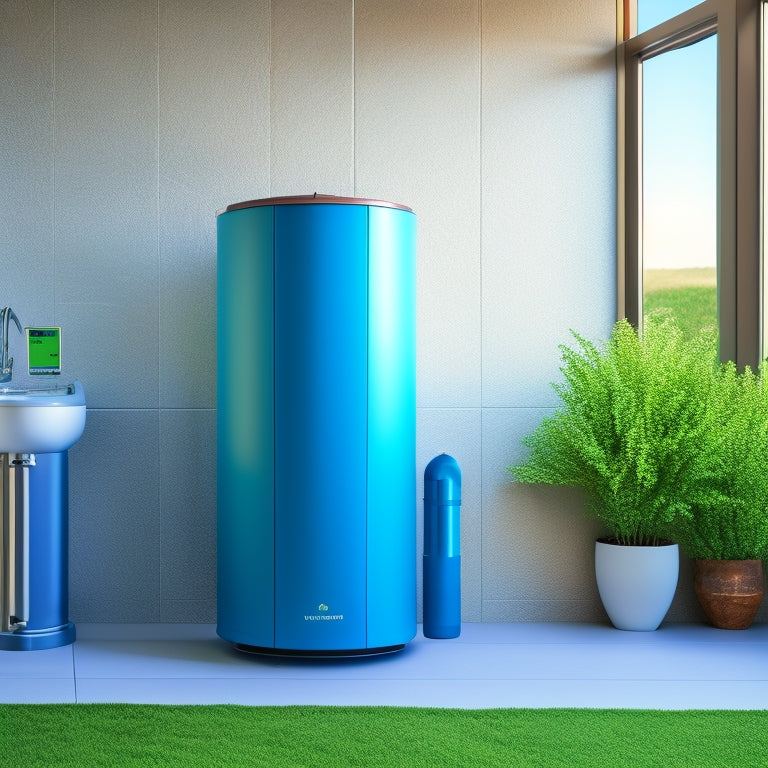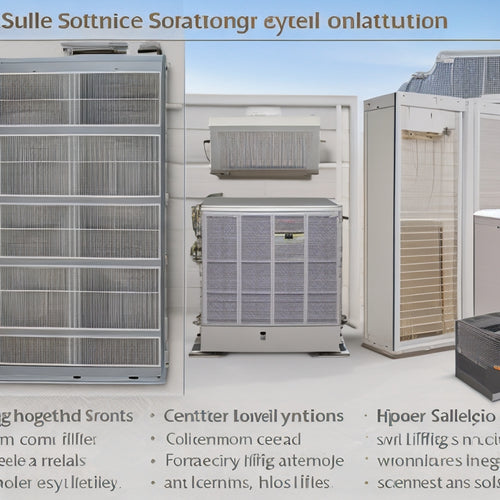
10 Best Greywater Heat Recovery Systems for Energy-Efficient Homes
Share
You're looking to optimize your home's energy efficiency with a greywater heat recovery system. By capturing thermal energy from wastewater, you can preheat incoming cold water, reducing energy needed for heating and saving on utility bills. High-efficiency heat transfer is essential, and innovative designs like spiral and plate-and-frame exchangers can improve performance. You'll want to take into account energy-efficient drainage systems, shower water heat recovery, and grey water recycling technologies. Investigate cost-effective heat recovery solutions, affordable installations, and DIY options. As you evaluate the top greywater heat recovery systems, you'll reveal the best fit for your energy-efficient home, and find even more ways to maximize your system's potential.
Key Takeaways
- High-efficiency heat transfer is crucial for optimizing greywater systems, and selecting the right heat exchanger is essential for maximizing energy recovery.
- Greywater heat recovery systems can reduce energy needed for heating water by up to 90%, saving on utility bills and enhancing energy independence.
- Shower water heat recovery is a significant aspect of greywater systems, with options including plate, spiral, and shell-and-tube heat exchangers.
- Cost-effective solutions that incorporate grey water recycling can lower energy bills and carbon footprint, making them an attractive option for energy-efficient homes.
- Modular designs and DIY solutions enable easy installation and scalability, promoting wider adoption of energy recovery solutions.
Grey Water Heat Recovery Basics
Grey water heat recovery systems capture the thermal energy present in wastewater, which would otherwise be lost, to preheat incoming cold water.
You'll find greywater sources in your daily activities, such as showering, washing dishes, and doing laundry. These sources provide a significant amount of thermal energy that can be reclaimed and reused.
By adopting sustainable practices, such as utilizing renewable energy sources, homeowners can further reduce their carbon footprint.
During system installation, a heat exchanger is typically placed in the drainage pipes to recover the heat energy. This process reduces the energy required to heat water for your household needs, saving you money on your utility bills and increasing your energy independence.
Top Grey Water Heat Exchangers
You'll want to choose a grey water heat exchanger that optimizes high-efficiency heat transfer, as this directly impacts the overall performance of your greywater heat recovery system.
With the increasing adoption of electric vehicles, fast charging infrastructure is becoming a vital aspect of sustainable living, making energy-efficient solutions like greywater heat recovery systems even more important.
Compact design solutions are also essential, as they enable easy integration into existing plumbing configurations.
High-Efficiency Heat Transfer
As high-efficiency heat transfer becomes a essential component of greywater heat recovery systems, selecting the right heat exchanger is imperative to maximize energy savings.
You'll want to prioritize heat exchangers with high heat transfer efficiency, ensuring that the maximum amount of heat is recovered from greywater.
Innovative designs, such as spiral or plate-and-frame heat exchangers, offer improved heat transfer rates and increased efficiency.
This is particularly important for commercial fleets shifting to electric vehicles, as solar-powered EV charging can greatly reduce fuel costs and greenhouse gas emissions.
By adopting sustainable energy solutions, homeowners and businesses can decrease their carbon footprint and support environmental responsibility.
By choosing a high-efficiency heat exchanger, you can greatly reduce energy consumption and lower your environmental impact.
This is essential for achieving energy freedom and minimizing your reliance on non-renewable energy sources.
Compact Design Solutions
Frequently, compact design solutions are essential for greywater heat recovery systems, particularly in applications where space is limited.
As you plan your energy-efficient home, you'll want to take into account modular systems that optimize compact storage. These systems are designed to minimize footprint while maintaining high performance.
Modular designs allow for easy installation, maintenance, and scalability. Furthermore, just as leading brands like Trina, Jinko, and Hanwha provide high-efficiency solar panels, you can choose from a range of compact heat exchangers that integrate seamlessly into your greywater system.
These exchangers are engineered to maximize energy recovery while minimizing space requirements. By selecting a compact design solution, you'll reap the benefits of energy efficiency without sacrificing precious space in your home.
Energy Efficient Drainage Systems
During the design and installation of greywater heat recovery systems, incorporating energy efficient drainage systems becomes an indispensable consideration.
You'll want to optimize your drainage system to maximize the benefits of greywater heat recovery. By doing so, you'll reveal significant drainage system advantages, including reduced energy consumption and lower utility bills.
Sustainable plumbing practices also play an important role in energy efficient drainage systems. By adopting these practices, you'll not only reduce your environmental footprint but also contribute to a more sustainable future.
Furthermore, integrating renewable energy sources, such as solar-powered EV charging, can further enhance the energy efficiency of your greywater heat recovery system.
When selecting a drainage system, look for features like low-flow rates, insulated pipes, and optimized pipe layouts to minimize heat loss.
Heat Recovery From Shower Water
When you take a shower, you're letting precious heat energy go down the drain - literally.
In fact, shower water heat loss is one of the most significant sources of energy waste in residential and commercial buildings.
You'll want to contemplate greywater heat exchanger options that can recover this energy and redirect it to supplement your water heating system.
Shower Water Heat Loss
As you step into a warm shower, the rejuvenating water cascades down your body, washing away the fatigue of the day.
However, what you may not realize is that a significant amount of energy is being wasted down the drain.
The thermal movement of shower water heat loss are striking: up to 90% of the energy used to heat the water is lost, making your shower a major contributor to your energy bill.
This inefficiency can be attributed to the low shower efficiency of traditional shower systems.
Greywater Heat Exchanger Options
You've identified the energy-wasting culprit in your shower system, and now you're ready to make use of the lost heat.
Greywater heat exchangers offer an efficient solution to recover heat energy from shower water. Plate heat exchangers, spiral heat exchangers, and shell-and-tube heat exchangers are popular options. Each type has its benefits, such as compact design, high heat transfer rates, and ease of exchanger maintenance.
When selecting a greywater heat exchanger, consider factors like flow rates, temperature ranges, and material compatibility.
Grey Water Recycling Technologies
Grey water recycling technologies play an essential role in greywater heat recovery systems, as they enable the efficient reuse of wastewater from sinks, showers, and washing machines. By leveraging these technologies, you can considerably reduce your water consumption and environmental impact. To guarantee a seamless greywater reuse experience, it's vital to take into account the following key factors:
| Factor | Description | Importance |
|---|---|---|
| System Maintenance | Regular cleaning and inspection to prevent clogging and contamination | High |
| Regulatory Compliance | Adherence to local regulations and standards for greywater reuse | High |
| Installation Challenges | Proper installation to avoid leaks, corrosion, and other issues | Medium |
| User Education | Understanding greywater reuse benefits and best practices | Medium |
| Market Trends | Staying updated on emerging technologies and industry developments | Low |
Cost-Effective Heat Recovery Solutions
By incorporating grey water recycling technologies into your system, you're not only reducing water consumption but also generating a significant thermal energy resource.
This heat energy can be utilized to reduce your energy bills and carbon footprint.
To maximize the benefits, consider the following cost-effective heat recovery solutions:
-
Affordable installations: Opt for compact and lightweight greywater heat exchangers that are easy to install and require minimal plumbing modifications.
-
DIY solutions: Employ pre-fabricated greywater heat recovery kits that can be assembled on-site, reducing labor costs and installation time.
-
Modular designs: Choose systems with modular components that can be easily scaled up or down depending on your specific needs, ensuring the best possible energy recovery without overspending.
These solutions enable you to take control of your energy consumption, promoting a more sustainable and self-sufficient lifestyle.
Advanced Grey Water Treatment Systems
You're now exploring the advanced grey water treatment systems that optimize heat recovery in greywater heat recovery systems.
These systems employ state-of-the-art grey water filtration methods to remove contaminants and suspended solids, ensuring a higher quality of water for heat recovery.
Grey Water Filtration Methods
Advanced grey water treatment systems employ a range of filtration methods to remove contaminants and pollutants from wastewater, making it suitable for irrigation, toilet flushing, and other non-potable purposes.
You'll find that these systems make use of various filtration techniques to achieve the best purification.
-
Mechanical filtration: removes suspended solids and particulate matter using physical barriers like membranes or filters.
-
Biological filtration: takes advantage of microorganisms to break down organic matter and eliminate pollutants.
-
Chemical filtration: employs chemical reactions to neutralize or remove contaminants, often using oxidation or disinfection processes.
Advanced Treatment Technologies
Implementing grey water treatment systems that can effectively remove a wide range of contaminants and pollutants is essential for producing high-quality effluent suitable for non-potable reuse.
You'll want to reflect on advanced treatment technologies that can tackle complex pollutants, ensuring your greywater meets stringent standards.
Membrane bioreactors, for instance, employ microorganisms to break down organic matter, followed by membrane filtration to remove suspended solids and bacteria.
Aerobic treatment systems, on the other hand, use oxygen to stimulate microbial growth, effectively degrading organic pollutants.
Hot Water Conservation Methods
Conserving hot water is essential in reducing energy consumption, and greywater heat recovery systems play a crucial role in this effort.
By implementing hot water conservation methods, you can markedly reduce your energy bills and carbon footprint. Here are some effective ways to conserve hot water:
-
Install water saving fixtures: Low-flow showerheads and faucets can reduce hot water usage without sacrificing performance.
-
Implement sustainable plumbing: Insulate pipes and use heat-resistant materials to minimize heat loss during water transportation.
-
Optimize hot water distribution: Use decentralized hot water systems or recirculating hot water systems to reduce the distance hot water travels, resulting in less energy waste.
Eco-Friendly Grey Water Management
Nearly 80% of wastewater generated in a typical household is grey water, which can be reused for irrigation and flushing toilets.
You can adopt eco-friendly grey water management practices to conserve water and reduce your environmental footprint. Implementing sustainable practices, such as installing grey water systems, can considerably reduce your water consumption.
By reusing grey water for non-potable purposes, you'll decrease the amount of wastewater entering sewage systems and conserve potable water for drinking and cooking. This approach not only saves water but also reduces the energy needed to treat and transport wastewater.
High-Performance Heat Recovery Units
About 30% of the energy used in your home is wasted as hot water flows down the drain. By installing a high-performance heat recovery unit, you can reclaim this energy and redirect it to your water heater, reducing your energy consumption and saving you money.
When selecting a high-performance heat recovery unit, consider the following key factors:
-
Efficiency: Look for units with high efficiency ratings, typically above 50%, to maximize energy recovery.
-
Flow rate: Ascertain the unit can handle your home's peak water usage to prevent reduced performance.
-
Installation flexibility: Choose units with flexible installation guidelines to accommodate your home's unique plumbing configuration.
Frequently Asked Questions
Can Greywater Heat Recovery Systems Be Installed in Existing Homes?
When you're considering upgrading your existing home, you'll face installation challenges, but you can still reap the benefits of greywater heat recovery systems by exploring retrofitting options that work around your home's unique constraints and plumbing layout.
How Often Do Greywater Heat Exchangers Need to Be Cleaned?
As you scale the parapets of your eco-friendly castle, you'll need to descend into the trenches of maintenance; greywater heat exchangers require regular cleaning every 3-6 months to prevent scaling, so brush up on those maintenance tips to keep your system flowing freely.
Are Greywater Heat Recovery Systems Suitable for Small Households?
You're wondering if greywater heat recovery systems are suitable for small households; the answer is yes, as they offer space-saving solutions that maximize efficiency benefits, making them ideal for compact homes where freedom from energy waste is paramount.
Can Greywater Heat Recovery Systems Be Used With Septic Systems?
When you're stuck between a rock and a hard place, you'll be relieved to know that greywater heat recovery systems can be used with septic systems, but you'll need to follow specific installation guidelines to guarantee compatibility and avoid any potential headaches.
Do Greywater Heat Recovery Systems Require Special Maintenance Training?
You'll find that greywater heat recovery systems do require special maintenance training to guarantee system efficiency, as you'll need to follow specific maintenance protocols to prevent clogs, corrosion, and scaling that could compromise performance and longevity.
Related Posts
-

Why Solar HVAC Filters Revolutionize Home Energy Efficiency
By adopting solar HVAC filters, you're shifting your home's energy reliance from fossil fuels to clean, renewable sou...
-

Green Deck Options: Earth-Conscious Choices for Your Home
You're looking for a deck that not only enhances your home's exterior but also aligns with your eco-friendly values. ...
-

10 Grid-Tied Wind Power Systems for Modern Homes
You're looking for a grid-tied wind power system to utilize wind energy for your modern home. Here are ten options to...


